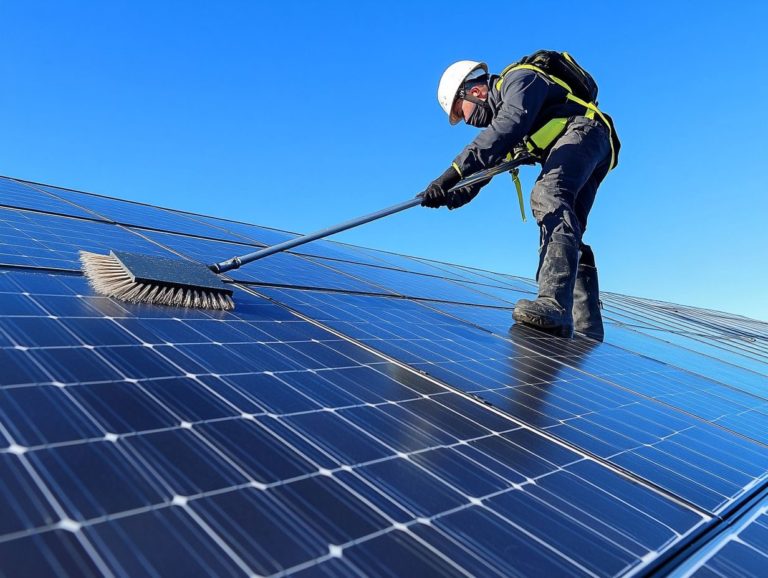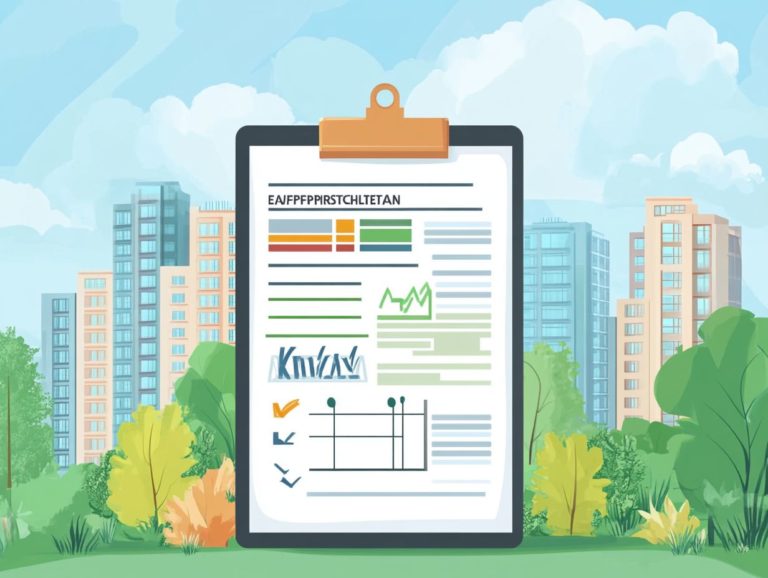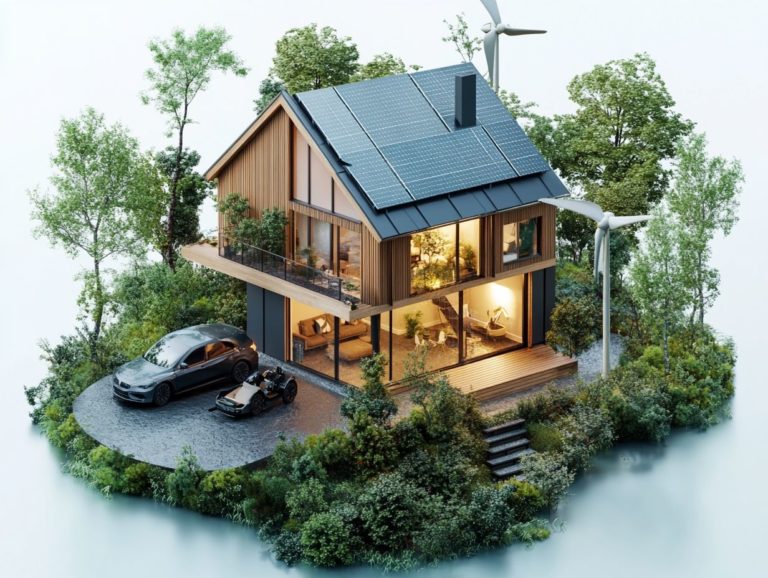How Can I Conserve Water at Home?
Every drop counts! Conserving water is essential for a sustainable future. Water is among the most vital resources, yet it often slips your mind, especially when considering the importance of water conservation.
As demands rise and climate challenges become more pressing due to droughts and climate change, conserving water is more crucial than ever. Now is the time to act!
This article delves into practical tips for reducing water usage both indoors and outdoors. It highlights efficient practices for household appliances and introduces innovative techniques like rainwater harvesting that empower you to make a meaningful impact.
Whether your goal is to lower your utility bills or contribute to a sustainable future, you’ll discover valuable insights and efficient strategies to help you conserve water effectively.
Contents
Key Takeaways:
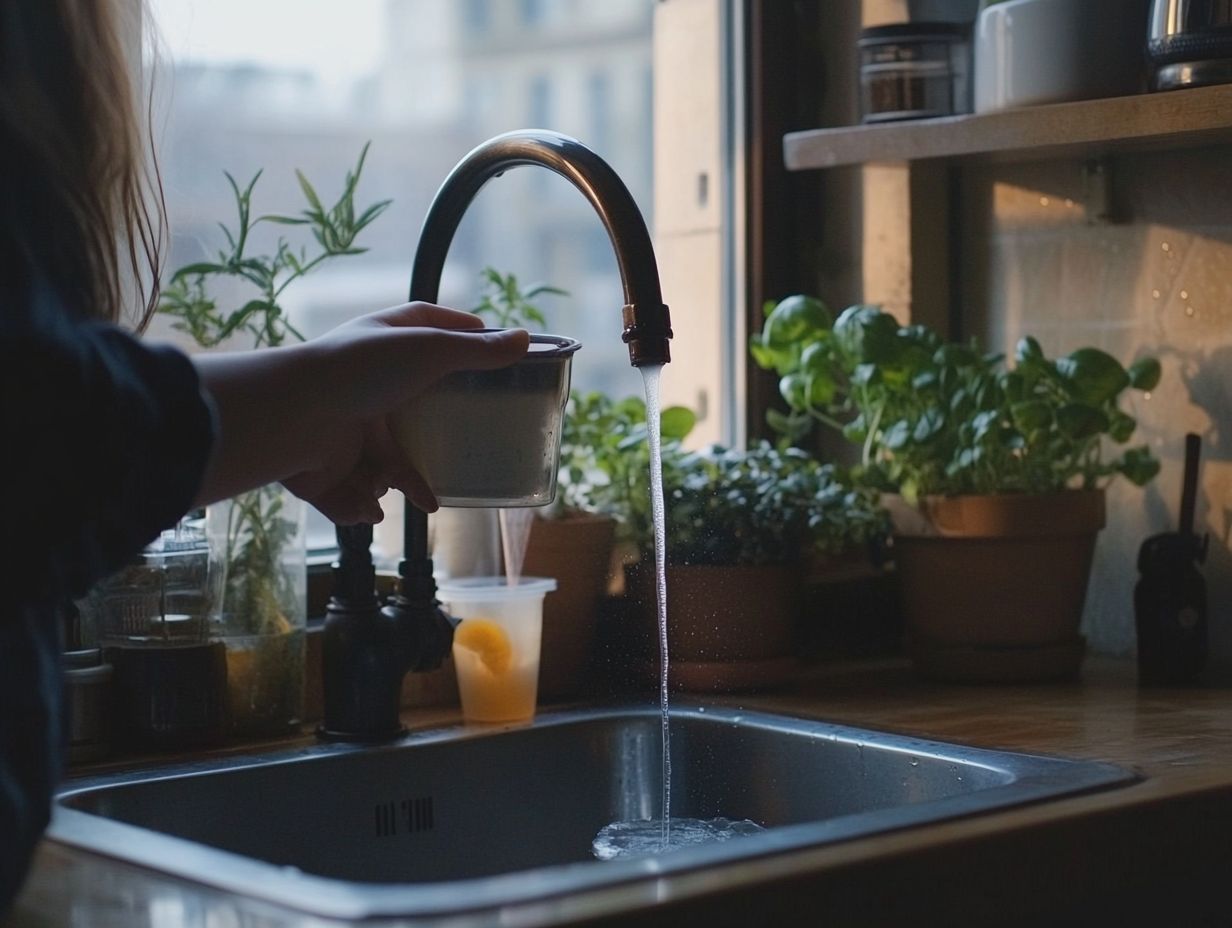
- Conserving water at home is crucial to protect our environment and ensure a sustainable future for generations to come.
- Simple indoor water conservation tips like fixing leaks and using low-flow fixtures can lead to significant water savings and lower utility bills.
- Using efficient appliances and adopting innovative techniques like rainwater harvesting can further reduce water consumption.
The Importance of Water Conservation
Water conservation is vital for sustaining your immediate resources and safeguarding the health of ecosystems and communities, especially in regions facing water scarcity.
As climate change escalates and droughts become increasingly common, the urgency of conserving water has never been more pronounced. This drives the need for innovative conservation strategies.
By recognizing water as a valuable resource, you can prioritize effective strategies for efficient usage, such as adopting water-saving appliances and minimizing waste. Organizations like the EPA and initiatives like Fix a Leak Week highlight the need for adopting water-saving behaviors, not just to cut costs but also to protect the environment for future generations.
Why is it Important to Conserve Water?
Conserving water is essential for safeguarding our invaluable resources. This is especially important given the rising costs of water and the imminent threats posed by drought and climate change.
As you navigate the realities of water scarcity, the effects extend beyond mere inconvenience. They ripple through ecosystems, impacting the variety of plant and animal life and altering habitats in profound ways.
Ultimately, this affects community resources. The economic implications are considerable; by adopting efficient water conservation practices and investing in water-efficient technology, you can achieve significant cost savings for both your household and your business.
Investing in water-efficient technologies, such as ENERGY STAR products, enhances your sustainability profile. Encouraging responsible usage allows you to reduce operational expenses.
With climate change amplifying these challenges and leading to unpredictable weather patterns, the strain on our already limited freshwater supplies becomes even more pronounced. Thus, proactive water management is essential for securing a resilient future for both the environment and local economies.
Indoor Water Conservation Tips
Implementing indoor water conservation tips presents a savvy opportunity for homeowners eager to trim their water and energy bills. This can be done while ensuring a comfortable living environment and enhancing energy efficiency.
By making simple adjustments in your bathroom, kitchen, and laundry routines, such as fixing leaks and using low-flow fixtures, you can unlock substantial savings.
Tackling leaks, upgrading to water-efficient fixtures, and embracing smart appliances are just a few impactful options available to reduce water consumption.
By maintaining your plumbing systems and opting for certified water-saving products, such as those labeled by WaterSense, your household can play a significant role in the broader movement toward water conservation and efficiency.
Start implementing one water-saving tip today!
Reducing Water Usage in the Home
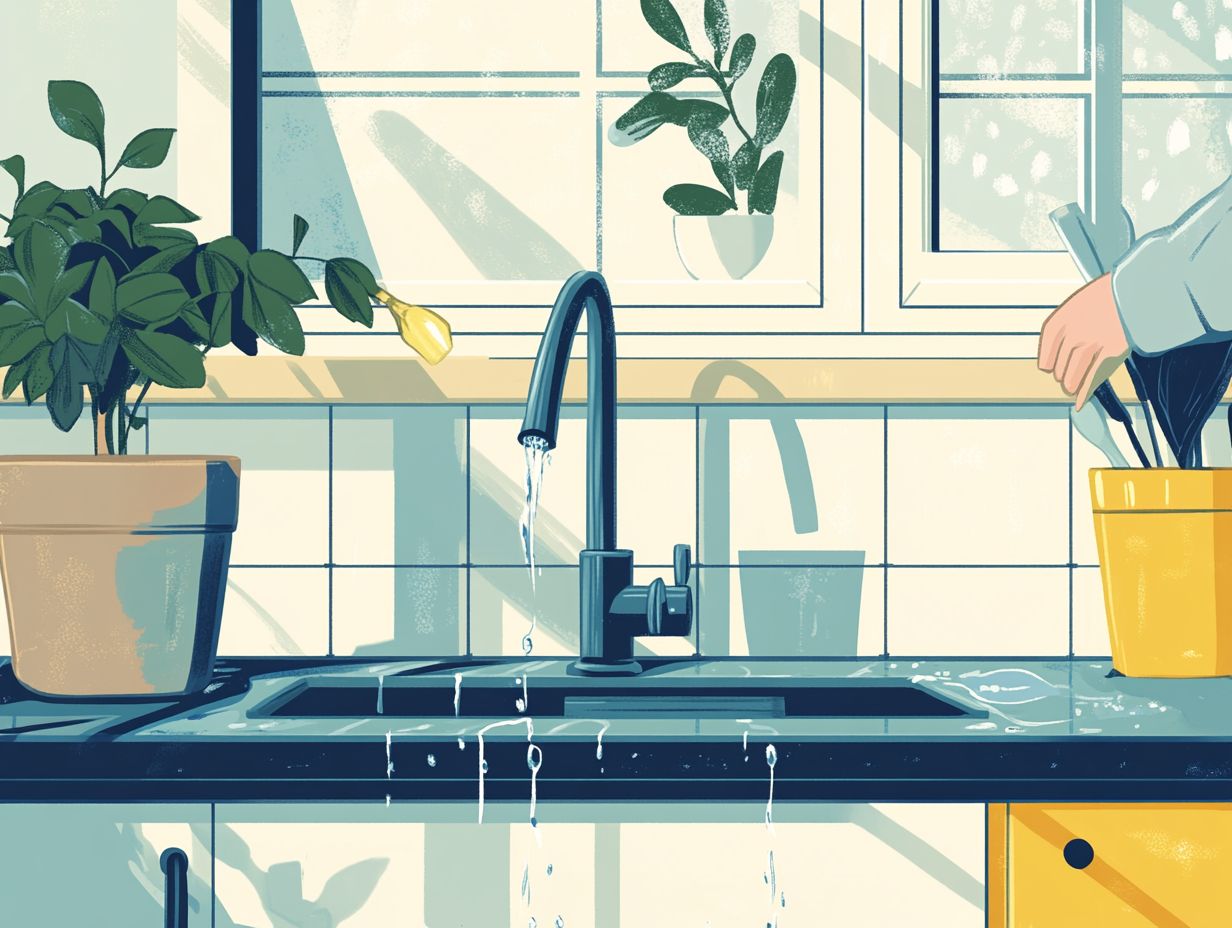
Reducing water usage at home is vital for effective conservation. There are strategies you can use, like auditing your water usage, to make a meaningful impact.
Consider installing dual flush toilets and efficient fixtures. They let you choose between a lower flush for liquid waste and a fuller flush for solid waste.
These innovative fixtures can save you thousands of gallons of water each year and enhance water efficiency.
You might remember the time you found a minor leak under the sink. Left unattended, that small drip could waste over 10,000 gallons annually. Don t wait! Fix those leaks now to save water!
Another simple yet effective change is swapping out standard showerheads for low-flow models. This can significantly reduce your water usage without compromising performance, keeping your energy bills low.
By using these efficient showerheads, a family of four could save upwards of 20,000 gallons of water a year. This leads to noticeable savings on household bills and benefits the environment by promoting a green lifestyle.
Outdoor Water Conservation Tips
Outdoor water conservation tips are essential for minimizing overall water consumption, especially in regions vulnerable to drought and climate-related challenges. It’s necessary to adopt sustainable practices.
By embracing sustainable landscaping practices, using native plants, and smart watering systems, you can dramatically reduce your outdoor water usage while still enjoying a stunning garden.
Opting for native plants that thrive on minimal water and setting up rain barrels to harvest rainwater are effective strategies for conserving water. They also support biodiversity and community initiatives.
By adopting these practices, you contribute to efforts aimed at tackling climate change and preserving precious resources.
Conserving Water in the Garden and Yard
Conserving water in your garden and yard is essential for sustainable landscaping. Adopting strategic practices can significantly minimize water waste while ensuring efficient irrigation.
By selecting native plants that thrive in your local climate, you beautify outdoor spaces and reduce the need for excessive watering. These resilient plants typically demand less maintenance and flourish with natural rainfall.
Optimizing your irrigation schedule is key. Watering early in the morning or later in the evening can dramatically cut down on evaporation and enhance water efficiency.
Don t overlook the power of mulch! By applying it around your plants, you ll help retain moisture in the soil and lessen the frequency of watering.
If you’re ready to take conservation to the next level, consider incorporating smart watering systems. These innovative solutions can adjust watering based on real-time weather conditions, ensuring your garden stays hydrated while maximizing water efficiency and reducing costs.
Efficient Water Use in Appliances
Efficient water use in appliances is a cornerstone of contemporary water conservation strategies. You increasingly seek products that minimize both water and energy consumption, such as ENERGY STAR rated devices.
By opting for certified water-saving fixtures like ENERGY STAR-rated washing machines and dishwashers you can significantly cut down on your water and energy bills.
These appliances are engineered to maximize performance without sacrificing quality, making them an astute choice for those who prioritize environmental responsibility and want to reduce their overall water consumption.
How to Save Water with Household Appliances
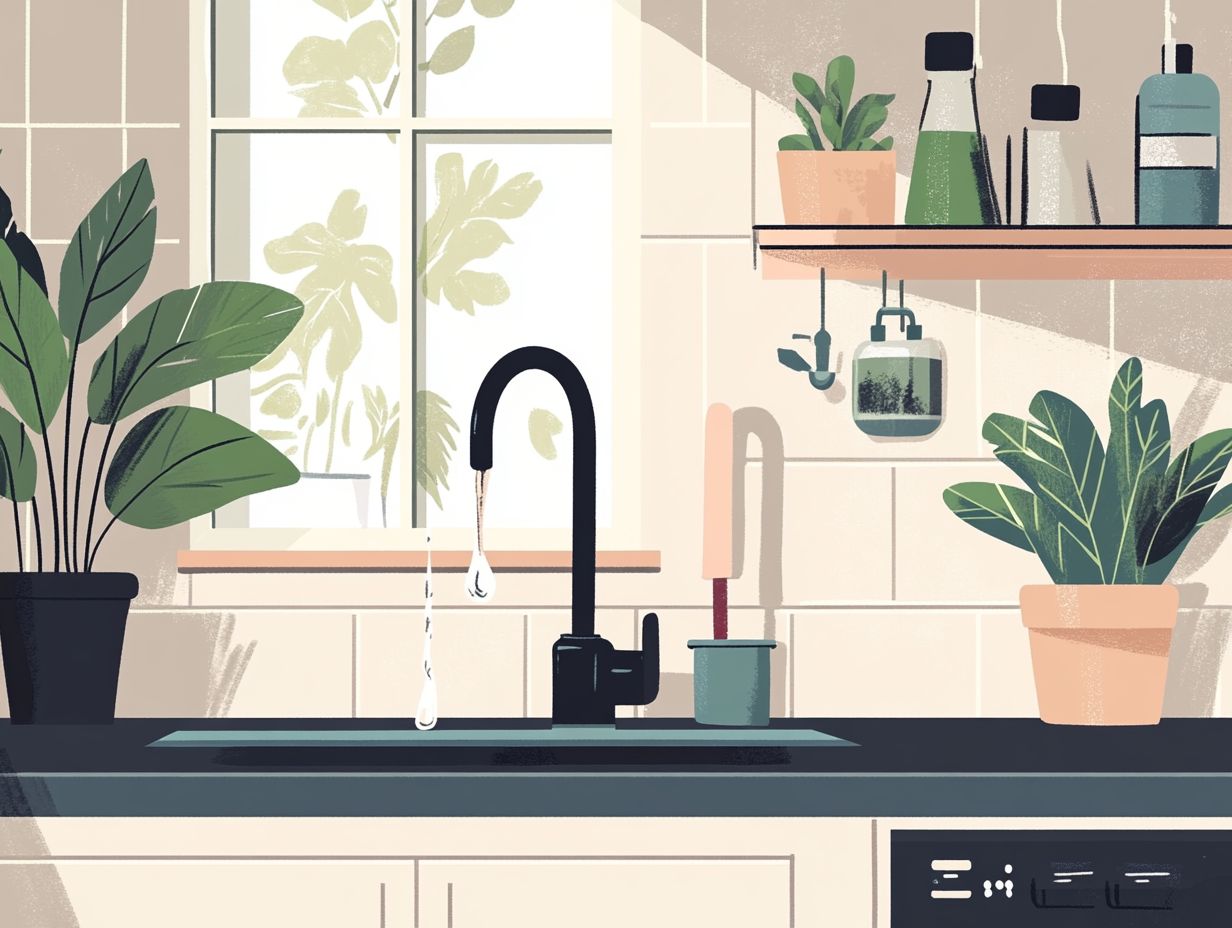
Saving water with household appliances isn t just a dream it s entirely within your reach through thoughtful selection and usage of water-saving products. By making mindful choices, including regular audits of your household water usage, you can effortlessly contribute to conservation efforts.
With a few simple yet effective strategies, such as using your dishwasher and washing machine only for full loads, you can cut down on water consumption while simultaneously lowering your utility bills. For instance, using your dishwasher and washing machine only for full loads can yield remarkable results. These appliances often consume the same amount of water regardless of the load size, contributing to overall efficiency. Running a dishwasher can save you up to 1,600 gallons of water each year compared to washing dishes by hand, which is a significant water-saving measure.
Regularly checking hoses and faucets for leaks is another crucial step. Unnoticed leaks can lead to significant water waste, adding up to gallons lost each day. Don’t wait start checking for leaks today! Taking the time to understand your water usage metrics is equally important. Tracking your consumption through audits empowers you to make more informed choices.
These small changes can create a sustainable lifestyle and save you money on bills!
Innovative Water Conservation Techniques
Innovative water conservation techniques are revolutionizing how you manage and utilize your water resources, making it more accessible than ever to embrace sustainable practices and improve efficiency.
Consider smart irrigation systems that actively monitor moisture levels or advanced leak detection technology. These innovations enhance efficiency and minimize waste, ultimately benefiting the environment.
By understanding and leveraging these remarkable tools, you can significantly reduce your consumption while also supporting environmental sustainability and building resilience against climate change, especially in vulnerable regions.
New Technologies and Strategies for Water Conservation
New technologies and strategies for water conservation, including WaterSense labeled products products that meet water efficiency criteria set by the EPA are transforming sustainable water management, presenting innovative solutions to long-standing challenges.
Among these advancements, smart meters and sophisticated leak detection systems stand out as true game-changers. Smart meters provide real-time data, empowering you to monitor your water usage more effectively and cultivate smarter consumption habits.
Leak detection systems pinpoint hidden leaks and alert you before they develop into costly repairs, helping you conserve water and minimize waste.
By incorporating these technologies into your daily routines, you can embrace practices like timed irrigation and efficient appliance usage, boosting overall water efficiency and aligning with sustainability goals.
Together, these strategies not only safeguard precious water resources but also foster a culture of environmental responsibility.
Frequently Asked Questions
How Can I Conserve Water at Home?
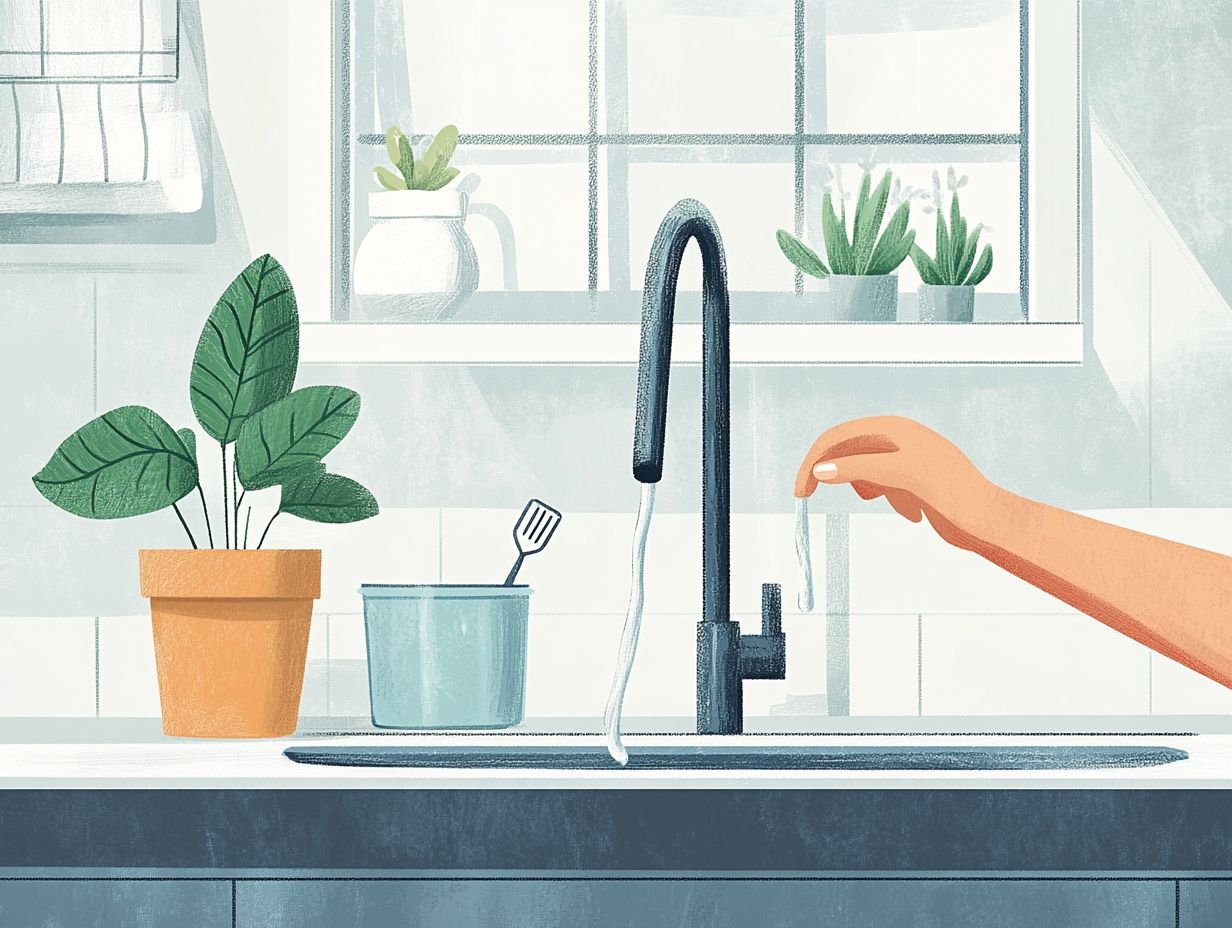
There are many simple ways to conserve water at home. Some tips include fixing leaky faucets, installing low-flow toilets, and using a rain barrel to collect water for gardening. Install low-flow toilets now to see a difference on your bill this month!
Why is it important to conserve water at home?
Conserving water at home helps to reduce our overall water usage, which is important for preserving this valuable natural resource. It also helps to lower our utility bills and protect the environment.
How much water can I save by fixing a leaky faucet?
A small leak from a faucet can waste up to 20 gallons of water per day. Fixing this leak can save over 7,000 gallons of water per year!
What are some other easy ways to save water at home?
Other simple ways to conserve water at home include taking shorter showers, turning off the faucet while brushing your teeth or shaving, and only running the dishwasher and washing machine when they are full.
Can I conserve water outdoors as well?
Yes, there are many ways to conserve water outdoors. Use a broom instead of a hose to clean your driveway.
Water your lawn in the early morning or evening to cut down on evaporation. Also, consider planting plants that need less water in your garden.
How can I get my family involved in conserving water at home?
Involve your family in water conservation! Make it fun and educational.
Start an exciting family challenge today to see who can save the most water this week. You can also teach your kids about the importance of water conservation through games and activities.


